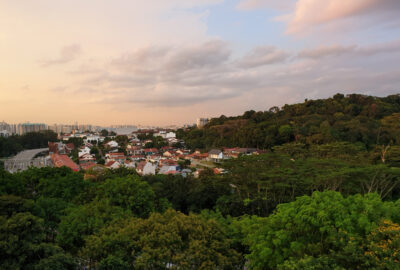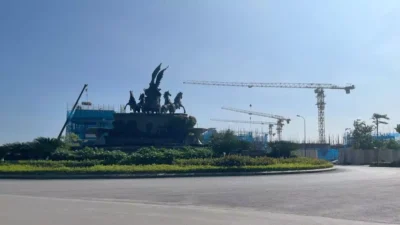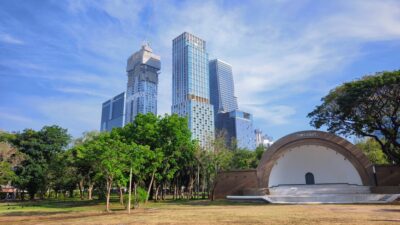7 questions with leading Cambodian property expert Sorn Seap

Cambodia’s property market has borne witness to frenetic changes in the last three years. From the increasingly luxurious condo market of Phnom Penh, the capital, and the hospitality offerings of Siem Reap, its spiritual capital, to the casinos of Sihanoukville and the economic zones in Poipet and Bavet, the kingdom has never been more open for business.
Sorn Seap, CEO of Phnom Penh-based real estate agency Key Real Estate Co Ltd, has seen those changes happen on the ground. As chairperson of the independent judging panel in the PropertyGuru Cambodia Property Awards for three years to date, he offers some indispensable knowledge of the movers and shakers in the emerging market.
We’ve posed some of our questions to Sorn Seap ahead of the glitzy gala dinner in Phnom Penh in May:
You’ve chaired the judging panel of the Cambodia Property Awards for several years now, and was a member of the inaugural panel. How has the residential market evolved in the past four years?
I noted that many housing projects nominated in this program, the selected projects, gain more reputation and recognition from local and international investors. There are now many types of developments in the country, including “boreys,” mixed-use developments, hotels, serviced apartments, townships, condos, and resorts. Phnom Penh’s residential market has become more attractive recently, with many developments still ongoing. Meanwhile, the residential markets in secondary locations like Sihanoukville are seeing substantial growth as well.
Which property locations are currently thriving in Cambodia?
Phnom Penh is the biggest development area; I see that every corridor of the 12 districts in the capital is being developed by various real estate companies. Phnom Penh’s CBDs are mostly developed into condos and apartments, while the suburbs are dominated by gated communities and landed housing projects.
What role does tourism play in Cambodia’s real estate market today?
Tourism growth in the city has already stimulated many investors to build a variety of properties to satisfy the demand of tourist arrivals every day. The influx of tourists requires a broad range of services, ranging from foods, entertainments to accommodations. Developments needed are restaurants, hotels, apartments, shopping malls, offices, casinos and much more.
A huge number of tourists has helped develop the real estate sector in Siem Reap and Sihanoukville. Many new constructions are being built, and land prices and rental rates have continued to rise notably. In addition to these areas, Kep and Kampot are being eyed on by investors as now there are more local and international visitors there.
What challenges does the Cambodian property market encounter and how is it coping with them?
In such a process of development, I noted that Cambodian real estate market faces some difficulties in term of regulations such as land management policy and construction law. Basic infrastructures such as roads, bridges, electricity, waste management, water system, are also challenges.
However, the government through relevant ministries has exerted a strong effort to address these encounters. It is also improving the investment atmosphere to encourage, protect, attract, and provide convenience to more investors.
How can the sector address the oversupply of residential units in Phnom Penh?
I think oversupply is a common occurrence in the market. When there is an oversupply, then there will be a price adjustment. To address this concern, government needs to intervene to ease the glut and keep a balance between demand and supply. At times, developers need to understand the market trend, and know who their potential buyers are. The developers themselves must show expertise to ensure the construction quality is good, design is attractive, and price is acceptable.
More: Sea to summit: where can foreign investors invest in Cambodia?
How can we promote home ownership among low-income and middle-class Cambodians?
Affordability relies on people’s monthly incomes. I believe that low- and middle-priced landed housing projects are potentially strong at present. However, I think that improving overall economic growth will help encourage low-class and middle-class Cambodians to buy more property. As a result, the increased number of middle-class families will mainly drive home ownership and overall real estate sentiment in the country.
In addition, people will buy properties when developers provide them more benefits. These can refer to prices, location, facilities, amenities, and much more.
Why is it important to gain recognition for new real estate projects in Cambodia?
I believe that there are three main reasons that developers should participate strive for excellence and participate in the Cambodia Property Awards:
First, Cambodia Property Awards is the best marketing campaign: It provides the opportunity for any project in Cambodia to promote their names to local and international buyers.
Second, it is home to a network of local and regional investors and buyers from eight Asian countries and many nations from Asia: from Sri Lanka to Hong Kong, Macau, China, and Japan.
Third, it is the best way to improve the quality of construction. Each project is selected through five evaluation steps with international standards, working with local and international experts who are professional at design, construction, real estate, and law.
I believe that Cambodia Property Awards will help attract more buyers and investors from the region and the rest of the world.
The 4th Annual PropertyGuru Cambodia Property Awards will be presented on 3 May 2019 at the Sofitel Phnom Penh Phokeethra. Learn more about this exclusive gala event here: http://www.asiapropertyawards.com/
Recommended
Meet the expert helping overseas investors crack Australia’s property market
Ivan Lam of property advisors Charter Keck Cramer helps clients navigate Australia’s complex real estate dynamics
6 spots to check out in Singapore’s Bukit list neighbourhood
The sought-after Singapore neighbourhood offers lifestyle amenities, green space, and new residential projects
Thailand’s real estate sector watches closely as the Shinawatras return to power
Time will tell if the return to power in Thailand of the Shinawatras will lift the country’s ailing real estate sector
China’s homebuying surge: Can new stimulus measures keep the market rally alive?
Stimulus measures have sparked a surge in homebuying activity around China, but many are sceptical the shift will endure








